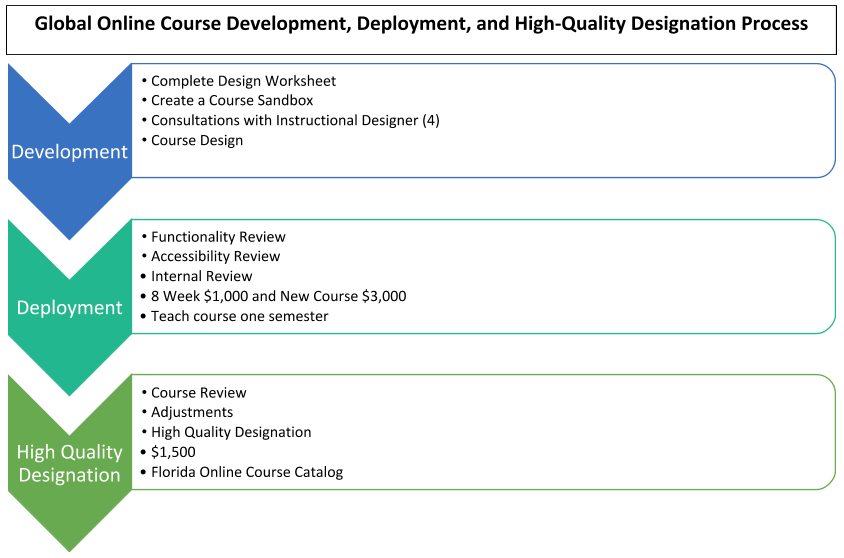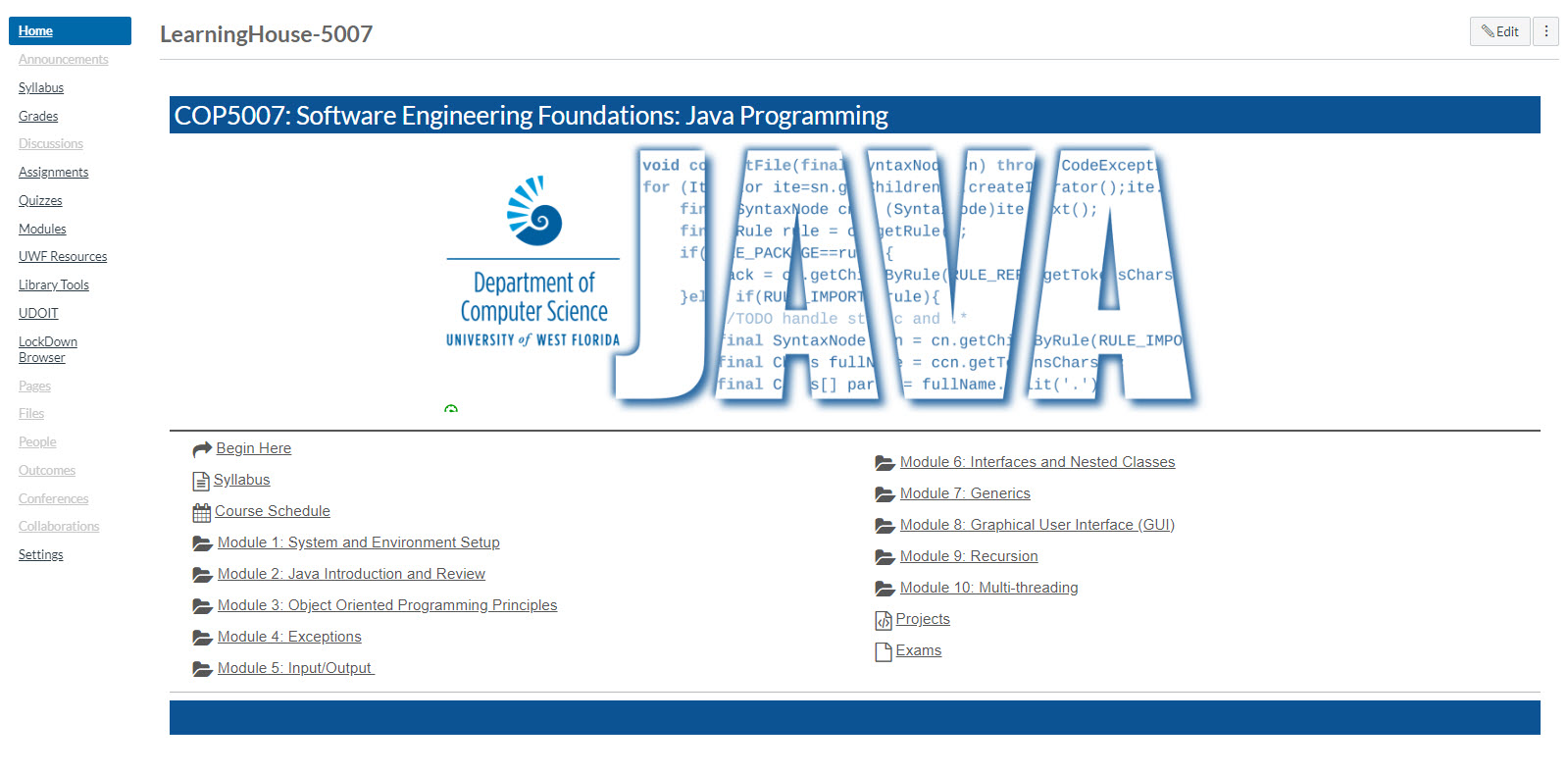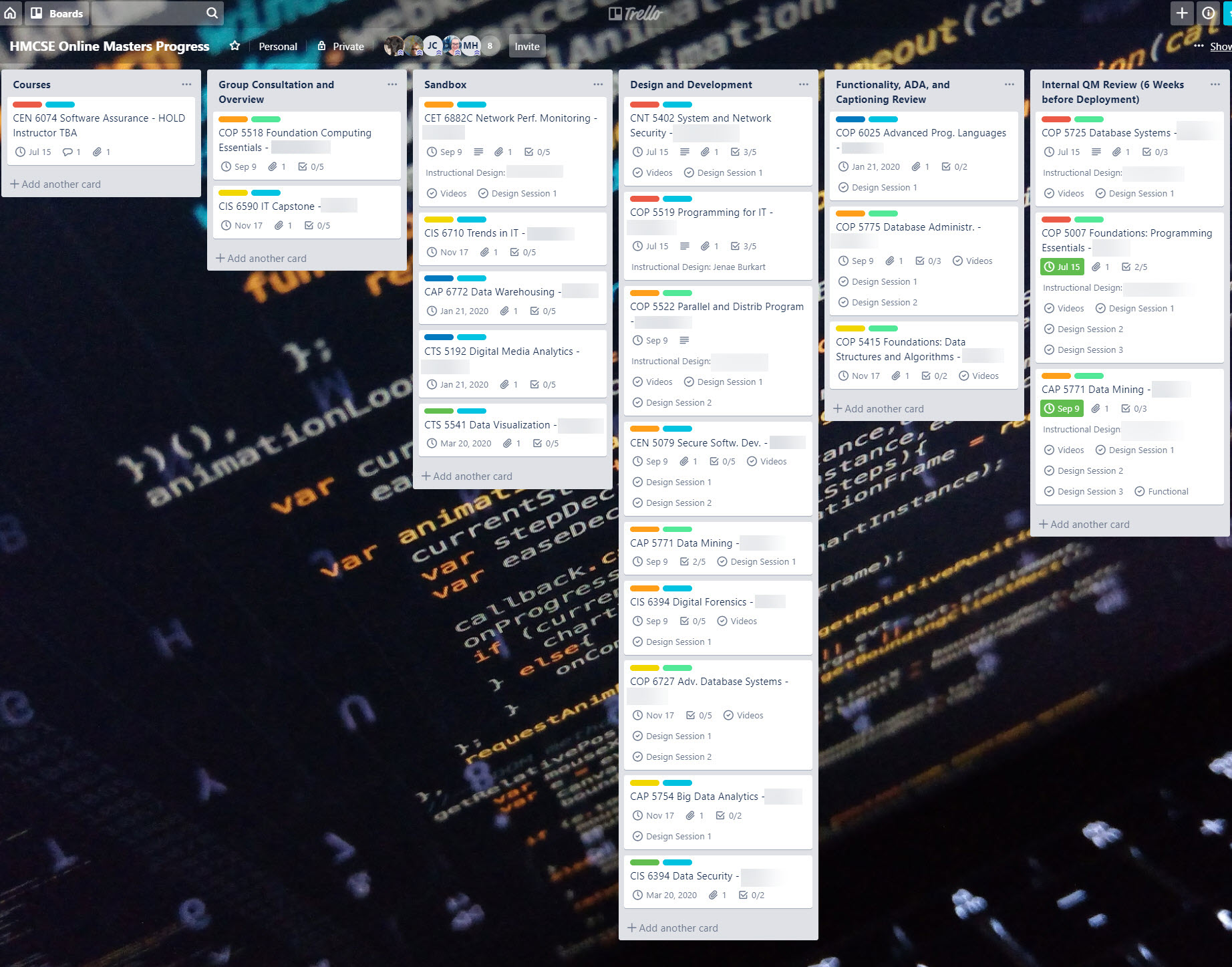by ,
The motto of the design team at Global Online is, “meet them where they are”. This concept means that the instructional designers meet faculty where they are based on each instructor’s skill level, needs, and resources.
Overview
University of West Florida (UWF) Global Online is using a team approach to support faculty with the development and redesign of online graduate programs in the Hal Marcus College of Science and Engineering (HMCSE). Development includes transitioning eighteen (18) sixteen-week courses to an eight-week format and completing development of (12) new courses: Program areas include cybersecurity, computer science, information technology, and data science.
The motto of the design team at Global Online is, “meet them where they are”. This concept means that the instructional designers meet faculty where they are based on each instructor’s skill level, needs, and resources. Support provided by Global Online includes a faculty member consultation with the team to identify course design plan and support needs; at least four course design work sessions with instructional designers; media development and accessibility and quality reviews. Faculty receive stipends for course redesign/development, and the team uses Trello for project management and tracking.
Introduction
UWF Global Online is using a personalized and team approach to support faculty with the development and redesign of four online graduate programs in the Hal Marcus College of Science and Engineering (HMCSE). The four new programs were implemented by the University of West Florida and HMCSE to provide online degrees that align with projected employment opportunities in the areas of computer science, information technology, cybersecurity, and data science. Cyberseek.org states that there are over 13,400 cybersecurity workforce gaps in the State of Florida and 1,300 cybersecurity jobs available in Northwest Florida alone.
Development needs include the transition of eighteen (18) sixteen-week courses to an eight-week format and complete development of twelve (12) new courses. Program areas include cybersecurity, computer science, information technology, and data science. Support and Resources Support provided by Global Online includes a group consultation, individual design sessions, media development, internal course reviews, and one external course review. Each faculty member meets with the Global Online team for a group consultation.

The goal of the initial consultation with the Global Online team is to identify a course design plan and support needs for each individual faculty member. Prior to the consultation, the faculty developer completes a course development worksheet to guide the development process. Checklists for the faculty member and instructional designers were developed to outline expectations and tasks to be completed.
Resources available to faculty include course planning documents and templates designed to meet Quality Matters design standards. Each instructor receives a Quality Matters Rubric Workbook to use as they move through the process. The workbook comes complete with annotations and strategies for meeting QM Standards. It also contains a Course Improvement Plan worksheet, which is especially useful for the courses requiring redesign.
The course design templates include a “Begin Here” module with pre-loaded resources that are kept up to date so that instructors do not have to worry about outdated information or links in their courses. Instructional designers create custom home pages for each course using attribution-free images from Pixabay.com. Global Online also houses a media lab for instructors creating their own video or audio content.

After the group consultation, an individual instructional designer is assigned to the instructor. The instructor receives at least four personalized course design work sessions. During the design sessions, the instructional designer reviews the course checklist, course materials, and course Sandbox then provide input, suggestions, and resources to improve the course. Instructional designers conduct accessibility and internal quality reviews of course design and materials as they are being developed or redesigned.
Meeting Faculty Where They Are
The motto of the design team at Global Online is, “meet them where they are”. This concept means that the instructional designers meet faculty where they are based on each instructor’s skill level, needs, and resources. The one-on-one design sessions allow the designer and instructor to form a synergetic relationship and create an atmosphere where the faculty provides content and the designer provides resources and options that spotlight that content. The design session can be held face-to-face, at multiple sites, and online through video conferencing. Several new design processes have emerged from the cooperative exchange between faculty and designer, including videos with SMART Notebook annotations and presentations with picture-in-picture. Designers often offer expertise in areas of teacher presence, media development, engagement strategies, and other high impact practices.
Through the design sessions, the designers and instructors have learned to approach courses in new and different ways. Some of the instructors are new to teaching graduate courses and needed additional help writing their course and module-level objectives at a higher level of Bloom’s Taxonomy. Another challenge has been condensing the course content down to eight weeks from sixteen. Instructors have been forced to think realistically about the cognitive load and what students can complete in eight weeks. Instructor grading during the eight-week timeframe is something faculty must consider as well.
OER and Publisher Content Publisher content, accessibility of software, and Open Educational Resources (OER) have been areas of focus during this project as well. Information Technology, Computer Science, Data Science, and Cyber Security are fields of study that are constantly evolving. Many of the instructors utilize cutting edge software and learning tools in order to best prepare their students for the workplace. In many of the courses within the department, the content in the course has to be updated every few weeks because of ongoing updates in the software. It is difficult to find a textbook that is relevant for longer than one year or even one semester. This prompted instructors and designers to work together to find up to date learning materials through vendor websites, such as Oracle.
Several instructors also utilize vendor created training materials instead of textbooks. For those instructors interested in OER, the instructional designers are able to work with the UWF Library in order to find suitable options through the Openly Available Integrated Search (OASIS) database and the Florida Orange Grove. Subject specialist librarians help faculty with discipline-specific resources and research needs as well as the Open Educational Resources Guide developed by the Library. While working with instructors during design sessions, one solution for OER was to encourage instructors of the department to create a repository of video lectures and learning materials that can be shared across multiple courses. This concept will allow the department to retain, reuse, revise, remix, and redistribute the instructional materials of their department’s exceptional faculty.
Course Quality and Accessibility
The team utilizes Panopto to create videos as well as closed caption videos within the courses. Blackboard Ally is utilized to identify documents and images within the course that are not accessible and then fix the issues or create alternative formats. Once the course design is complete, the course is submitted for an internal quality review and reviewed by three instructional designers. When the reviews are complete, the instructor attends a course review session to go over suggestions for improving the course. When the course is deployed, the faculty receive a stipend for each course redesign/development.
The faculty member will teach the course for one semester and then meet with the instructional designer to make additional improvements as needed. The faculty member then submits the course for a Quality Matters External Review. Once the course meets High Quality, the faculty members receive an additional stipend and high-quality designation.
Tracking and Progress
In addition to meetings with the individual instructors, the instructional design team meets regularly with the Dean and Chairs of the College to discuss progress and issues as they arise. Monthly reports are also provided to the Dean and Chairs on course and project progress. The design team uses Trello for project management and tracking of course development progress. JIRA is also utilized for ticket tracking and reporting purposes.

References
Cybersecurity Supply And Demand Heat Map. (n.d.). Retrieved June 2, 2019, from https://www.cyberseek.org/heatmap.html